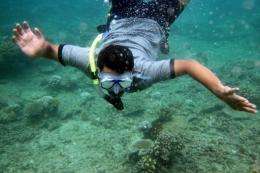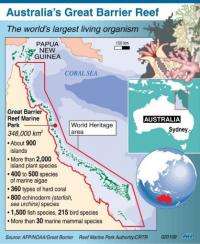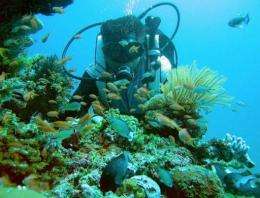Scientists say Asia's corals dying en masse

Coral reefs in Southeast Asia and the Indian Ocean are dying from the worst bleaching effect in more than a decade, Australian marine scientists said Tuesday.
The bleaching, triggered by a large pool of warm water which swept into the Indian Ocean in May, has caused corals from Indonesia to the Seychelles to whiten and die, Australia's Centre of Excellence for Coral Reef Studies said.
Reefs in the Philippines, Sri Lanka, Myanmar, Thailand, Malaysia and Singapore were also affected by the phenomenon under which sea temperatures rose by several degrees Celsius in Indonesia, researcher Andrew Baird said.
"It is certainly the worst coral die-off we have seen since 1998. It may prove to be the worst such event known to science," he said.
Baird, a fellow at James Cook University, said the magnitude of the event was so large, and the ocean temperatures in some places raised so much higher than normal, that it was "almost certainly a consequence of global warming".

He said for six to eight weeks from mid-May the temperatures were high enough to cause bleaching of the corals in Indonesia's Aceh, the area worst hit by the event.
"You jump into the water and you are just surrounded by white and dead corals," he said. "It is an extraordinary sight. The locals tell us they have seen nothing like this before."
Baird said the massive die-off was expected to compare in scale and magnitude to the damage caused in 1998, when warmer water bleached reefs globally and about 16 percent were seriously degraded.
"This is the second big global bleaching event that we have documented," he told AFP.
"The scale of the event is so large that it is going to take reefs a long time to recover," he added.
The bleaching is caused by the warm water sweeping over the reefs, shocking the corals and causing them to shed the algae which nourish them. If corals fail to regain their algae, they starve to death.

Baird said it was too early to say whether Australia's Great Barrier Reef, a major tourist attraction swarming with marine life, would be damaged but that he expected bleaching to affect reefs in the Andaman Sea and central Pacific.
"Once the reef dies you lose both live coral cover, which lots of fish need... but then everything that feeds on them will disappear as well," he said, adding that he expected some fish species to decline within a year.
He said in Aceh alone, an area with some unique marine creatures, there would be a loss of biodiversity.
"There's a very good chance that there will be some local extinctions both of endemic fish and of coral," he said.
Baird said the reefs could take years to recover, heavily impacting fishing and tourism in the region and could become a security issue.
"It's one of the reasons that countries like Australia need to act quickly and decisively on climate," he said.
Scientists say corals are vital to marine life because they provide habitats for a vast variety of creatures and absorb large levels of poisonous carbon dioxide.
(c) 2010 AFP
















